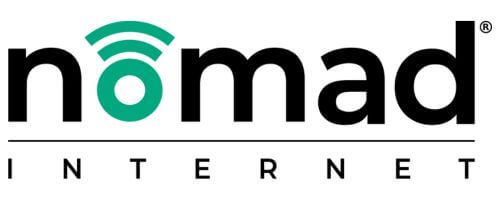In today’s fast-paced world, a reliable internet connection is essential for everything from social media surfing and gaming to streaming and remote work. Given the numerous options available, selecting the best Internet Service Provider (ISP) might be difficult.
This comprehensive article examines the top internet providers of 2024, outlining their features and potential downsides. Each provider is given a five-star rating to assist you in making an informed decision. We are delighted to give an open comparison to help you decide which Internet service best suits your needs.

Content
Overview of Nomad Internet
Nomad Internet has developed as a leading provider of services designed for people who live in remote areas or are always on the move. Unlike traditional internet providers, Nomad Internet relies on cutting-edge wireless technologies to provide dependable, smooth internet connections. Traditional Nomad Internet, on the other hand, uses cutting-edge wireless technology to provide regular and perfect Internet access in areas where traditional providers frequently fail to provide service. Their cutting-edge approach to connectivity ensures that consumers can stay connected no matter where they are, closing a key market gap.
Nomad Internet: Embracing a Client-Focused Strategy
Nomad Internet is proud of its client-focused approach. They provide various solutions to fit clients’ diverse demands and budgets, ensuring that they find a solution that works for them. Furthermore, their flexible no-contract policy allows customers to pay monthly without being constrained by long-term obligations. This flexibility will benefit people whose living arrangements or travel patterns are subject to frequent change.
Nomad Internet: Trailblazing in Mobile and Adaptable Connectivity
Nomad Internet is a pioneer in delivering adaptive and portable internet services suited for today’s mobile and rural communities. Because a contract ties no one, the service is offered every month, and because anybody may set up the product, it can be used and installed rapidly. Its primary purpose is to connect those with the least internet access available, making it an excellent option for many underserved communities. Customer service is another area where Nomad Internet shines. Their fast and polite customer service guarantees that problems are resolved immediately. This is especially crucial for users who depend on their internet connection for business or other critical duties.
Nomad Internet is a trailblazer in terms of providing internet access to nomadic and rural communities. Nomad Internet was designed with travelers, remote workers, and rural inhabitants in mind, ensuring connectivity in areas where other providers would struggle. Nomad Internet connects regions that standard ISPs typically ignore, using cutting-edge wireless technology. Because of its versatility, this option is great for those who require reliable internet while on the go. One of Nomad Internet’s most notable advantages is its ability to traverse great distances.
Comparing Alternatives to Nomad Internet
Internet at AT&T : AT&T provides fiber, DSL, and fixed wireless internet services. Because of the speed and endurance of the fiber-optic connection, AT&T is now the favored provider for home and commercial users. AT&T’s large supply infrastructure enables them to provide a wide range of services, from simple home internet connection plans to business line solutions. This means that the organization can meet the needs of a customer base with diverse ICT requirements for ICT-related services.
Pros: AT&T’s fiber-optic network provides some of the fastest and most reliable Internet connections available, making it ideal for demanding tasks such as gaming, streaming, and conference calls. Furthermore, AT&T has outstanding nationwide coverage and allows customers to bundle services such as phones and televisions, making their bills with the company more affordable.
Cons: Despite this, the available plans can be quite expensive, especially when considering AT&T, which may preclude certain clients from using those contracts. Furthermore, DSL services are often fast and dependable when they are accessible. However, they are not immune to the general defects of any telecommunications network, and the quality of service varies according to the customer’s location. This is especially true for people who reside in rural or poorly populated regions.
Internet at Home on T-Mobile : T-Mobile Home Internet offers wireless internet connectivity over its 5G network. This is a straightforward and practical solution, particularly in distant areas where traditional cable alternatives are unavailable. T-Mobile is appealing to many rural customers because it can provide high-speed internet connection in regions lacking traditional infrastructure thanks to its cutting-edge 5G technology.
Pros: Because T Mobile does not require the assistance of a professional, there are no specific installation requirements to follow, allowing customers to stay connected at any time. That’s why many people find it appealing when combined with no data caps. There may be fewer possibilities for getting a wired internet connection in areas where 5G has been deployed.
Cons: Regardless of user base and geographic location, network speeds can be an issue. As a result, some locations may require higher service quality than others. On the other hand, some potential customers reject the service since it is not widely available in some places.
The ability to use 5G for home Internet demonstrates how ingeniously T-Mobile helps people in remote areas stay connected to the outside world. They may not be as widely available elsewhere, but their low costs and boundless data make them stand out.
Xfinity : Xfinity, operated by Comcast in the United States, is now the most popular cable internet provider. It has several pricing tiers, ranging from economical to more expensive alternatives based on speed. Second, Xfinity’s worth is illustrated by users’ ability to connect to a variety of Wi-Fi networks while using certain Internet service providers. Wi-Fi hotspots provide clients with additional alternatives for selecting the plan that best meets their needs and budget, in addition to the many options supplied by Xfinity.
Pros: Because Xfinity offers a range of plans, it can advise clients on which one is best for them in terms of speed, want, and cost. The large coverage area and cable contact with phone and TV services are additional disadvantages. In terms of connection, clients benefit from having access to a wide range of Wi-Fi hotspot coverage whether they are out and about.
Cons: The maximum data allowance should be fixed. Simultaneously, most cable competition plans give a maximum data limit of 200GB on Xfinity; some plans offer this amount but at a substantially higher cost. Situations in which prices rise after the offer ends and a customer’s monthly spending exceed their budget.
In this sense, the company might be considered one of the equal rivals in terms of available content and applicable tariffs. People benefit from Wi-Fi hotspots because they provide access to additional venues for portable internet connections.
Verizon FiOS : Verizon Fios subscribers have access to one of the fastest and most reliable internet connections via fiber-optic service. Fios provides a smooth online experience, which is especially beneficial in households with several gadgets and internet connections. Since Verizon moved to fiber-optic, users can always expect the quickest and best connection available, making it the top choice—especially for those who want the best.
Pros: Verizon Fios is known for having some of the fastest Internet connections available, and it has shown to be well worth the investment. All but a few of Shaw’s Canadian plans allow you to change the quantity of internet consumption. As a result, there is no overage charge. Customer service is another insightful service that Verizon provides, especially if it is included in the package that customers eagerly expect from the company.
Cons: Because of its restricted availability, Verizon Fios has unique issues. Some regions only have a few cities and need support to provide services in rural areas. Furthermore, there is still a higher-than-average frequency of service, particularly among service providers with the fastest speeds accessible.
As a result, Verizon Fios is differentiated by its connection speed and reliability. Most plans provide an unlimited data consumption option, allowing consumers to often utilize internet-dependent activities such as gaming, video streaming, and conferencing.
Internet Spectrum : Spectrum Internet provides cable internet connections in a variety of packages for both home and commercial purposes. It is suitable for many households because it is well-known for providing free data to its consumers and is easily accessible. It is significant because it ensures that other people around the country can use the Spectrum network to access the internet from their homes and offices.
Pros: One of Spectrum’s key advantages is that its no-contract programs allow clients to switch without being bound by previous selections. Their no-data-limit strategy is ideal for internet users who frequently stream or play games, download large amounts of data, and so on. Spectrum not only provides good coverage, but it also gives the convenience of bundling, which is desirable to many households.
Cons: Spectrum, on the other hand, has been criticism for having high pricing that change as soon as the deal expires, despite being on the opposite end of the service. There are also several inconsistencies in customer support contacts. For example, some consumers say that their navigation makes it difficult for them to address difficulties fast.
Spectrum’s concept of no data restrictions and no obligations for internet connections is beneficial to customers who require flexibility. As a result, they have a large audience, implying that many individuals can benefit from these enterprises’ products and services.
Cox Internet : Cox Internet provides a variety of cable internet services to meet customers’ needs. In addition, they offer other useful services to typical households, such as home automation and security. Cox’s commitment to provide a wide range of services guarantees that they can meet the needs of their consumers, from basic internet access to full-service home security.
Pros: Cox Corporation provides a wide range of plans and download speeds to meet the demands and budgets of its consumers. This is because their bundles, which include TV, phone, and home security services, offer more value to clients who want to get all of their home security and communication devices from a single source. Cox’s extensive coverage in urban areas makes it more accessible to the majority of people.
Cons: While Cox provides various benefits, the majority of its plans are subject to data limits, which may be problematic for some internet users. Furthermore, plans with faster speeds and higher tiers are more expensive and may only be affordable to a limited few.
Given their adaptability and the variety of Cox plans available, it may be appropriate for a wide range of clients. The organization offers a wide range of services, including home security, which are valuable.
Frontier Online : Frontier Communications offers DSL and fiber internet services, with a primary focus on simple and understandable plans. Because of their link with simplicity, they suit a wide range of people. Frontier is a wonderful choice for those who require easy, stable connections because its content is significant and the internet services are cheaply priced.
Pros: The majority of Frontier’s plans do not include data limits, and the company’s most affordable plans are geared to meet customers’ needs on a tight budget. When available, fiber availability alternatives give a unique opportunity to provide consumers with a reliable internet connection. The Frontier grows into areas with limited access by making it available in suburban, rural, and remote locations.
Cons: Some customers have voiced unhappiness with Frontier’s customer service, citing sluggish responses and the need to resolve difficulties. Furthermore, individuals seeking high bandwidth may find DSL slower than cable or fiber.
According to this analysis, users can profit from Frontier’s no-data-cap policy and concentration on reasonably priced rates. One of its disadvantages is that its customer service is not as sophisticated as that of some of its competitors; yet, its costs are very modest, and it can be accessed from a distance.
HughesNet : When other internet connections are unavailable, HughesNet, a sort of satellite internet, is the most viable option. Phone traces them by providing a wide selection of plans and nationwide coverage, with a focus on dependable service. HughesNet can provide internet services in areas where other forms of access are not physically feasible by utilizing satellite technology. Therefore, each subscriber must be online.
Pros: Unlike cable or fiber internet, HughesNet offers satellite internet service with access from anywhere in the United States. S. The service offers a variety of options, all with the same speed and data savers to help you manage your usage.
Cons: Satellite internet’s high latency can have a significant impact on real-time activities like online gaming and video conferencing. In addition to having extremely high purchasing restrictions, HughesNet’s speed is often slower than that of other ISPs, including cable and fiber-optic.
Hughesnet has certain distinct advantages over cable or fiber, even if their speed measurements are slower. They also offer reliable service and data storage capabilities.
Century-Link : CenturyLink offers fiber and DSL internet services with no annual contracts and transparent pricing. Their Price for Life promise gives clients peace of mind by ensuring that specific plans will not see price rises.
Pros: Using CenturyLink internet services offers the benefit of being covered by a Price for Life offer, which ensures that specific plans will not grow in price over time. This will allow the customer to manage their finances over time better. Policies that specifically forbid one-year contracts are admirable; for those who can get fiber, the internet is reliable and fast in such areas. Furthermore, because of the company’s transparent pricing strategy, clients can comprehend how much they are paying for the services provided.
Cons: It occasionally achieves low speeds, ideal for customers who want quick connections. Furthermore, because fiber is rare in many regions worldwide, millions of customers may continue to benefit from the provider’s best deals.
End Note
To summarize, the choice of an internet provider is influenced by various factors, including one’s location, spending capacity, and internet usage patterns. In general, Nomad Internet is best suited for persons who must be “on the move” and reside in a rural location with intermittent internet connectivity. Verizon Fios and AT&T Internet are excellent choices for high-speed internet access and other services that require consistent connections. Not only that, but the elimination process, which evaluates the benefits and drawbacks of each carrier, will allow users to select the carrier that best meets their needs and provide an optimal online experience.

From MMORPGs to MOBAs, Rex Collins is your MMO maniac. Dive into his captivating reviews and in-depth analyses of the online gaming universe.








